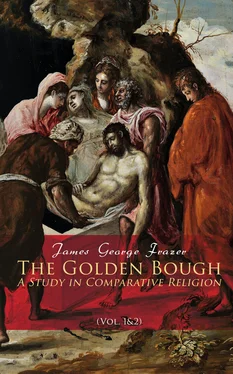The King of Iddah told the English officers of the Niger Expedition, “God made me after his own image; I am all the same as God; and He appointed me a king.”157
Sometimes, at the death of the human incarnation, the divine spirit transmigrates into another man. In the kingdom of Kaffa, in Eastern Africa, the heathen part of the people worship a spirit called Deòce, to whom they offer prayer and sacrifice, and whom they invoke on all important occasions. This spirit is incarnate in the grand magician or pope, a person of great wealth and influence, ranking almost with the king, and wielding the spiritual, as the king wields the temporal, power. It happened that, shortly before the arrival of a Christian missionary in the kingdom, this African pope died, and the priests, fearing that the missionary would assume the position vacated by the deceased pope, declared that the Deòce had passed into the king, who henceforth, uniting the spiritual with the temporal power, reigned as god and king.158 Before beginning to work at the salt-pans in a Laosian village, the workmen offer sacrifice to a local divinity. This divinity is incarnate in a woman and transmigrates at her death into another woman.159 In Bhotan the spiritual head of the government is a person called the Dhurma Raja, who is supposed to be a perpetual incarnation of the deity. At his death the new incarnate god shows himself in an infant by the refusal of his mother's milk and a preference for that of a cow.160 The Buddhist Tartars believe in a great number of living Buddhas, who officiate as Grand Lamas at the head of the most important monasteries. When one of these Grand Lamas dies his disciples do not sorrow, for they know that he will soon reappear, being born in the form of an infant. Their only anxiety is to discover the place of his birth. If at this time they see a rainbow they take it as a sign sent them by the departed Lama to guide them to his cradle. Sometimes the divine infant himself reveals his identity. “I am the Grand Lama,” he says, “the living Buddha of such and such a temple. Take me to my old monastery. I am its immortal head.” In whatever way the birthplace of the Buddha is revealed, whether by the Buddha's own avowal or by the sign in the sky, tents are struck, and the joyful pilgrims, often headed by the king or one of the most illustrious of the royal family, set forth to find and bring home the infant god. Generally he is born in Tibet, the holy land, and to reach him the caravan has often to traverse the most frightful deserts. When at last they find the child they fall down and worship him. Before, however, he is acknowledged as the Grand Lama whom they seek he must satisfy them of his identity. He is asked the name of the monastery of which he claims to be the head, how far off it is, and how many monks live in it; he must also describe the habits of the deceased Grand Lama and the manner of his death. Then various articles, as prayer-books, tea-pots, and cups, are placed before him, and he has to point out those used by himself in his previous life. If he does so without a mistake his claims are admitted, and he is conducted in triumph to the monastery.161 At the head of all the Lamas is the Dalai Lama of Lhasa, the Rome of Tibet. He is regarded as a living god and at death his divine and immortal spirit is born again in a child. According to some accounts the mode of discovering the Dalai Lama is similar to the method, already described, of discovering an ordinary Grand Lama. Other accounts speak of an election by lot. Wherever he is born, the trees and plants, it is said, put forth green leaves; at his bidding flowers bloom and springs of water rise; and his presence diffuses heavenly blessings. His palace stands on a commanding height; its gilded cupolas are seen sparkling in the sunlight for miles.162
Issuing from the sultry valleys upon the lofty plateau of the Colombian Andes, the Spanish conquerors were astonished to find, in contrast to the savage hordes they had left in the sweltering jungles below, a people enjoying a fair degree of civilisation, practising agriculture, and living under a government which Humboldt has compared to the theocracies of Tibet and Japan. These were the Chibchas, Muyscas, or Mozcas, divided into two kingdoms, with capitals at Bogota and Tunja, but united apparently in spiritual allegiance to the high pontiff of Sogamozo or Iraca. By a long and ascetic novitiate, this ghostly ruler was reputed to have acquired such sanctity that the waters and the rain obeyed him, and the weather depended on his will.163 Weather kings are common in Africa. Thus the Waganda of Central Africa believe in a god of Lake Nyanza, who sometimes takes up his abode in a man or woman. The incarnate god is much feared by all the people, including the king and the chiefs. He is consulted as an oracle; by his word he can inflict or heal sickness, withhold rain, and cause famine. Large presents are made him when his advice is sought.164 Often the king himself is supposed to control the weather. The king of Loango is honoured by his people “as though he were a god; and he is called Sambee and Pango, which mean god. They believe that he can let them have rain when he likes; and once a year, in December, which is the time they want rain, the people come to beg of him to grant it to them.” On this occasion the king, standing on his throne, shoots an arrow into the air, which is supposed to bring on rain.165 Much the same is said of the king of Mombaza.166 The king of Quiteva, in Eastern Africa, ranks with the deity; “indeed, the Caffres acknowledge no other gods than their monarch, and to him they address those prayers which other nations are wont to prefer to heaven. … Hence these unfortunate beings, under the persuasion that their king is a deity, exhaust their utmost means and ruin themselves in gifts to obtain with more facility what they need. Thus, prostrate at his feet, they implore of him, when the weather long continues dry, to intercede with heaven that they may have rain; and when too much rain has fallen, that they may have fair weather; thus, also, in case of winds, storms, and everything, they would either deprecate or implore.”167 Amongst the Barotse, a tribe on the upper Zambesi, “there is an old, but waning belief, that a chief is a demigod, and in heavy thunderstorms the Barotse flock to the chief's yard for protection from the lightning. I have been greatly distressed at seeing them fall on their knees before the chief, entreating him to open the water-pots of heaven and send rain upon their gardens. … The king's servants declare themselves to be invincible, because they are the servants of God (meaning the king ).”168 The chief of Mowat, New Guinea, is believed to have the power of affecting the growth of crops for good or ill, and of coaxing the dugong and turtle to come from all parts and allow themselves to be taken.169
Amongst the Antaymours of Madagascar the king is responsible for the growth of the crops and for every misfortune that befalls the people.170 In many places the king is punished if rain does not fall and the crops do not turn out well. Thus, in some parts of West Africa, when prayers and offerings presented to the king have failed to procure rain, his subjects bind him with ropes and take him by force to the grave of his forefathers, that he may obtain from them the needed rain.171 It appears that the Scythians also, when food was scarce, put their king in bonds.172 The Banjars in West Africa ascribe to their king the power of causing rain or fine weather. So long as the weather is fine they load him with presents of grain and cattle. But if long drought or rain threatens to spoil the crops, they insult and beat him till the weather changes.173 When the harvest fails or the surf on the coast is too heavy to allow of fishing, the people of Loango accuse their king of a “bad heart” and depose him.174 On the Pepper Coast the high priest or Bodio is responsible for the health of the community, the fertility of the earth, and the abundance of fish in the sea and rivers; and if the country suffers in any of these respects the Bodio is deposed from his office.175 So the Burgundians of old deposed their king if the crops failed.176 Some peoples have gone further and killed their kings in times of scarcity. Thus, in the time of the Swedish king Domalde a mighty famine broke out, which lasted several years, and could be stayed by the blood neither of beasts nor of men. So, in a great popular assembly held at Upsala, the chiefs decided that king Domalde himself was the cause of the scarcity and must be sacrificed for good seasons. So they slew him and smeared with his blood the altars of the gods. Again, we are told that the Swedes always attributed good or bad crops to their kings as the cause. Now, in the reign of King Olaf, there came dear times and famine, and the people thought that the fault was the king's, because he was sparing in his sacrifices. So, mustering an army, they marched against him, surrounded his dwelling, and burned him in it, “giving him to Odin as a sacrifice for good crops.”177 In 1814, a pestilence having broken out among the reindeer of the Chukch, the Shamans declared that the beloved chief Koch must be sacrificed to the angry gods; so the chief's own son stabbed him with a dagger.178 On the coral island of Niuē, or Savage Island, in the South Pacific, there formerly reigned a line of kings. But as the kings were also high priests, and were supposed to make the food grow, the people became angry with them in times of scarcity and killed them; till at last, as one after another was killed, no one would be king, and the monarchy came to an end.179 As in these cases the divine kings, so in ancient Egypt the divine beasts, were responsible for the course of nature. When pestilence and other calamities had fallen on the land, in consequence of a long and severe drought, the priests took the sacred animals secretly by night, and threatened them, but if the evil did not abate they slew the beasts.180
Читать дальше












